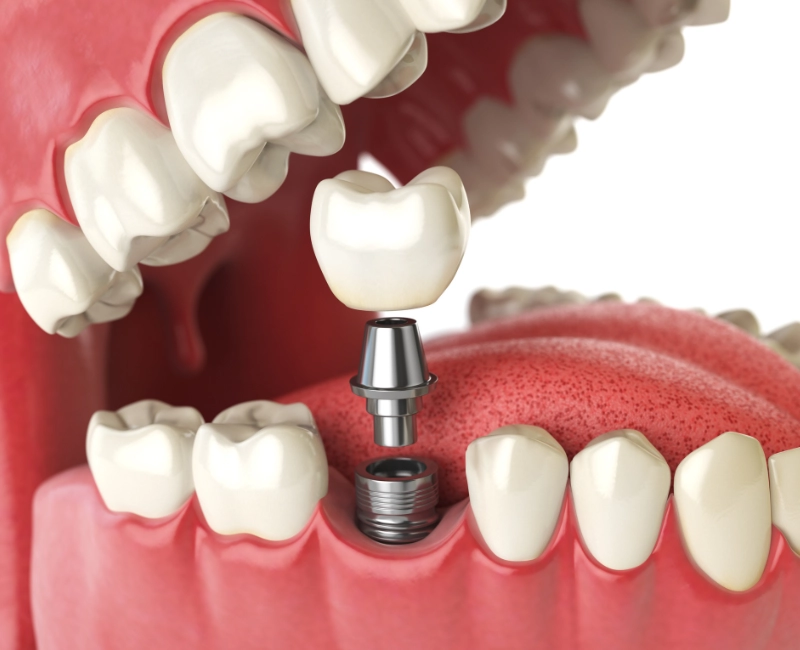Dental Implants in Woodbridge, Vaughan

Dental implants are one of the most advanced and reliable solutions for replacing missing teeth. Whether you’ve lost a tooth due to injury, decay, or gum disease, dental implants in Woodbridge offer a long-term solution that looks, feels, and functions like a natural tooth. For patients in Woodbridge and beyond, dental implants can restore not just the appearance of your smile but also the health and function of your mouth.


Why Choose Us for Dental Implants in Woodbridge?
When it comes to restoring your smile with dental implants in Woodbridge, Sunny Day Dental stands out for its commitment to quality and patient care. Our skilled dental team uses advanced technology and proven techniques to deliver long-lasting, natural-looking results.
From consultation to aftercare, we provide personalized support to ensure your dental implant journey is smooth, comfortable, and successful.
- Experienced and Compassionate Team: Our dental professionals are highly trained and committed to providing gentle, patient-focused care.
- State-of-the-Art Technology: We use the latest dental technology to ensure accurate diagnoses and effective treatments.
- Comprehensive Dental Services: From preventive care to restorative treatments, we cover all aspects of general dentistry.
- Family-Friendly Environment: We cater to patients of all ages, making our practice perfect for the entire family.
What are Dental Implants?
Components of a Dental Implant:
- Implant: The titanium or zirconia post placed in the jawbone.
- Abutment: A connector that attaches to the implant and supports the crown or prosthetic.
- Crown: The visible part of the implant, custom-made to match your natural teeth.
Benefits of Dental Implants in Woodbridge
Dental implants offer numerous benefits over other tooth replacement options:
- Natural Look and Feel: Implants are designed to look, feel, and function like natural teeth, providing confidence and comfort.
- Long-Term Solution: With proper care, dental implants can last a lifetime, making them a durable and cost-effective option in the long run.
- Improved Oral Health: Unlike bridges, dental implants don’t require the alteration of neighboring teeth. They also prevent bone loss in the jaw, maintaining the natural structure of your face.
- Enhanced Functionality: Dental implants allow you to chew, speak, and smile confidently without the worry of slipping dentures or gaps.
Long-Term Results
When properly placed and cared for, dental implants have a high success rate (up to 98%) and provide a permanent solution to missing teeth. Regular dental check-ups and good oral hygiene ensure they remain strong and functional for many years.
Types of Dental Implants in Woodbridge
When considering dental implants in Woodbridge, it’s important to understand the different types available to suit various dental needs and bone conditions. At Sunny Day Dental, we offer multiple implant options to restore your smile with lasting results.

These are the most common type of dental implant, placed directly into the jawbone. Once the surrounding gum tissue heals, a second surgery is needed to connect the abutment and crown.

These implants are placed under the gum but on or above the jawbone, rather than inside the bone. They’re used for patients with insufficient bone height who cannot undergo bone grafting.

Mini implants are a smaller version of traditional implants and are often used for patients with less jawbone density. They can also be used for securing dentures.

Trustindex verifies that the original source of the review is Google. Very pleasant staff and very nice Doctor. He is very professional and has human touch in his approach and made my fear reduce of going to dentist. Highly encourage people to go for any dental issuesTrustindex verifies that the original source of the review is Google. I didn't see a dentist for 25 years. Them I went to Sunny Day Dental and now I look forward to seeing my dentist. No fear...No pain... and I csn actually talk to my dentist. He is a normal human. Love this place. Recommend it to everyone.Trustindex verifies that the original source of the review is Google. Visted Sunnyday team for my wisdom tooth , very experienced team , receptionist were very knowledgeable related to insurance and benefits and explained everything clearly. Will be my go to dentistry moving forward. I would recommend it.Trustindex verifies that the original source of the review is Google. Dr Manoj is very thorough and honest, he never recommends any procedure that he doesn’t believe in. If you are looking for an honest dentist, this is the one.Trustindex verifies that the original source of the review is Google. Dr C is amazing. Treatment was pain free. I highly recommend this dental clinic.Trustindex verifies that the original source of the review is Google. Friendly and experienced dentist. It's my 3rd time visiting.Trustindex verifies that the original source of the review is Google. This dental office is amazing!!! The staff are great always polite. They always make my son feel welcomed and relaxed.
Frequently Asked Questions
Q1. How long do dental implants last?
With proper care, dental implants can last a lifetime. At our dental implant clinic in Woodbridge, we emphasize the importance of regular dental check-ups and good oral hygiene to ensure the long-term success and durability of your implants.
Q2. Is the dental implant procedure painful?
Q3. How long does it take to get dental implants?
Q4. Can I get dental implants if I have gum disease?
Q5. Are dental implants worth the cost?
While dental implants are a larger upfront investment, their durability, functionality, and long-term benefits make them a cost-effective solution compared to other tooth replacement options.
